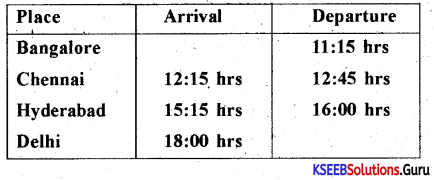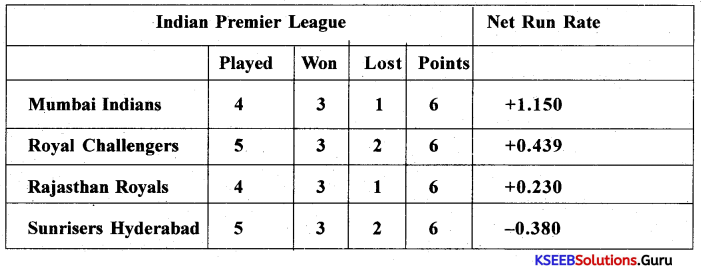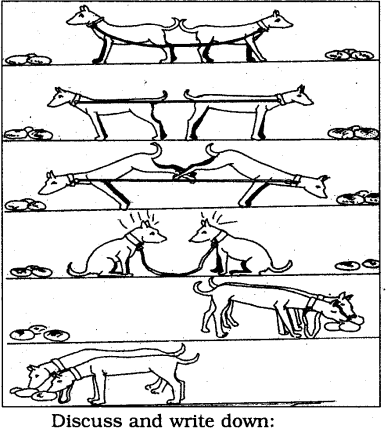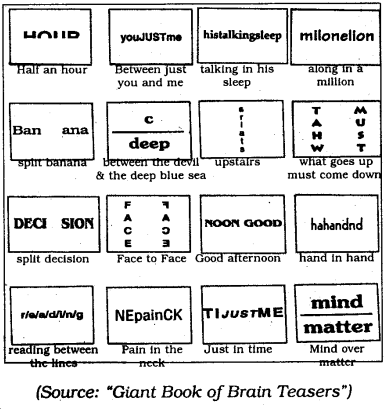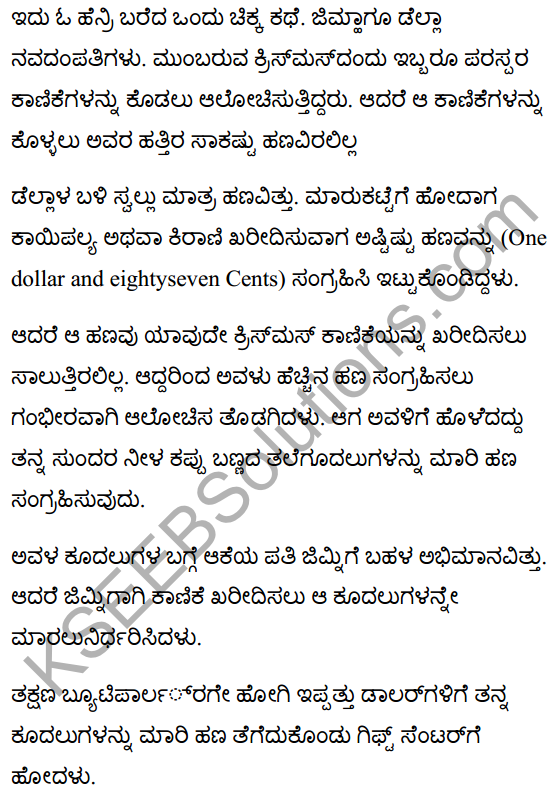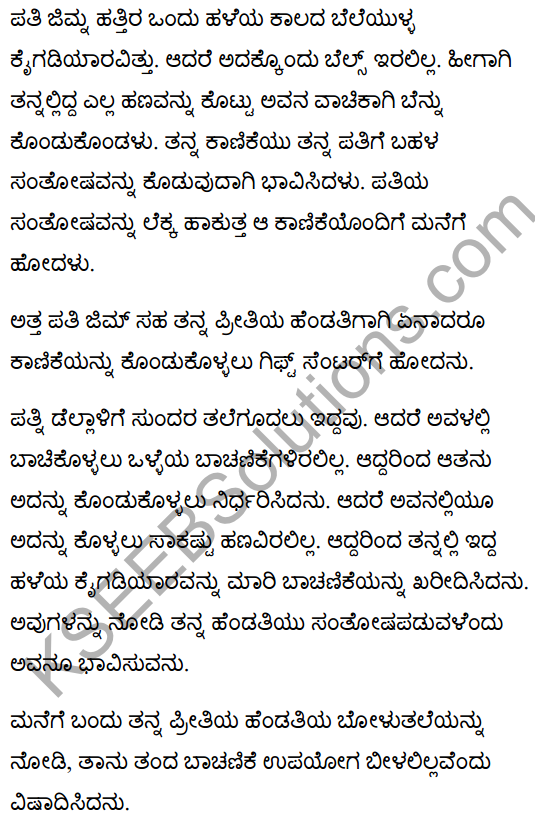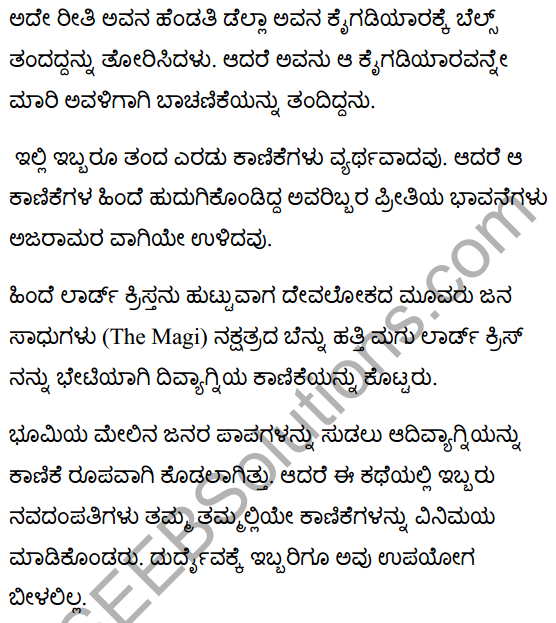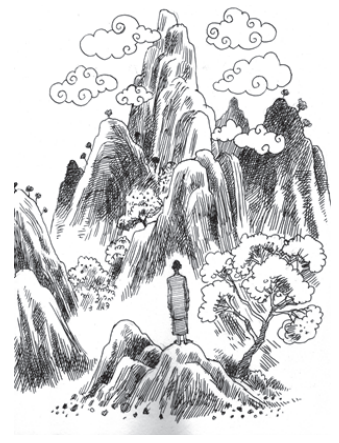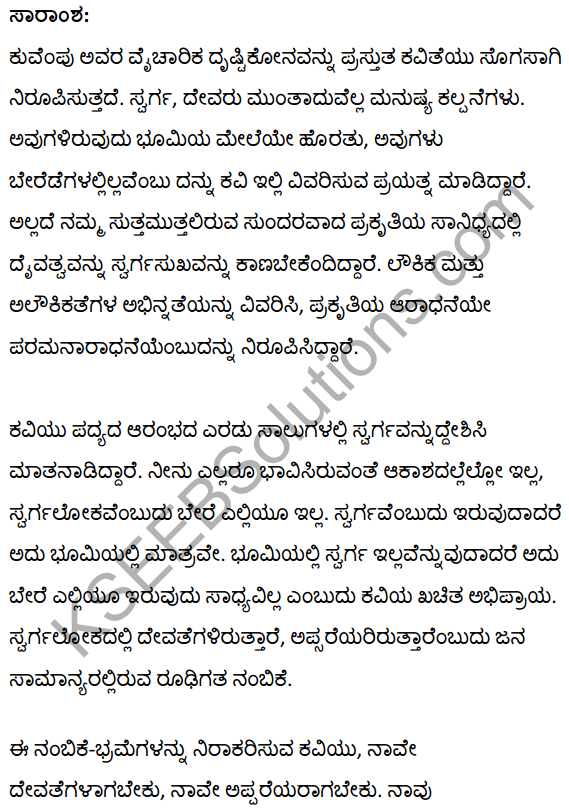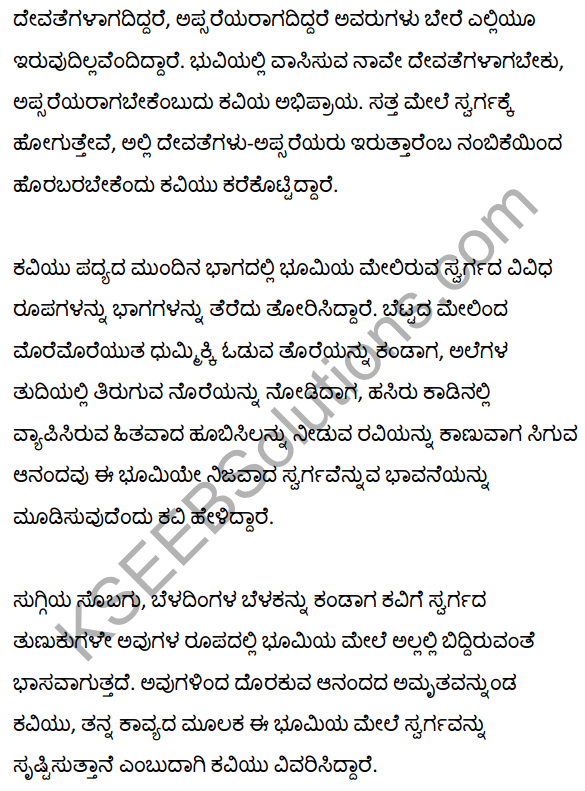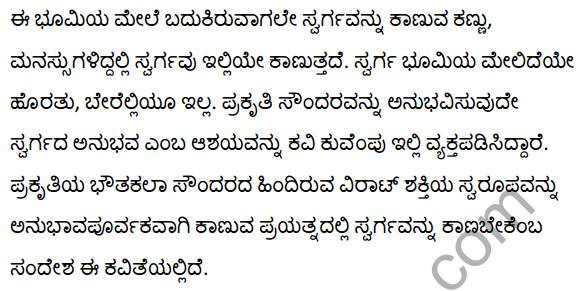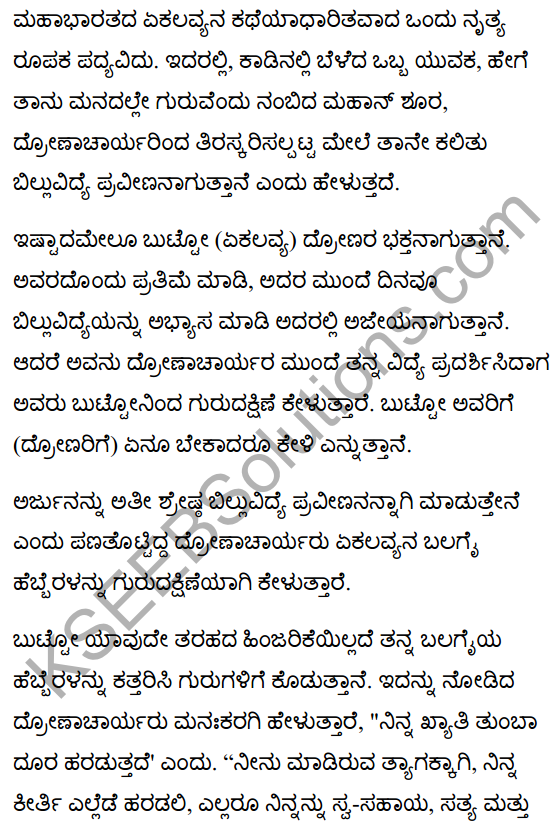Students can Download 1st PUC English Model Question Paper 9 with Answers, Karnataka 1st PUC English Model Question Papers with Answers help you to revise complete Syllabus.
Karnataka 1st PUC English Model Question Paper 9 with Answers
Time: 3 Hrs. 15 Mins.
Max. Marks: 100
Instructions
- Follow the prescribed limit while answering the questions.
- Write the correct question number as it appears on the question paper.
- One mark question attempted more than once will be awarded zero.
- For multiple-choice questions choose the correct answer and rewrite it.
I. Answer the following in a word, a phrase, or a sentence each. (12 × 1 = 12)
Question 1.
Name one of the members appointed to the Commission of Enquiry in ‘The Gentlemen of the Jungle.
Answer:
Mr. Buffalo.
Question 2.
One of the things that the boy likes to do in the poem ‘The School boy’ is
Answer:
To rise in a summer morning
Question 3.
When, according to the native doctors, would the medicines lose their potency?
Answer:
If they told others about their medicines, the medicines would lose their potency.
Question 4.
How far was the big city from the narrator’s hometown in ‘Oru Manushyan’?
Answer:
About a thousand and five hundred miles from his home.
Question 5.
Mention any one of the things which should be made available free of cost in ‘Money Madness’.
Answer:
Bread.
Question 6.
How old was Babar Ali when he actually started his school?
Answer:
He was 9 years old.
Question 7.
What gave the Spring everlasting youth, in the poem ‘Do not ask of Me, My Love’?
Answer:
Speaker’s beloved’s beauty.
![]()
Question 8.
What had the Goddess instructed Mara, in his dream in ‘Watchman of the Lake’?
Answer:
Td build a tank for river Veda’s waters.
Question 9.
Who does ‘you’ refer to in the poem ‘The Farmer’s Wife’?
Answer:
The Farmer.
Question 10.
According to Douglass, why were the child and its mother separated by their masters?
Answer:
To hinder the development of the child’s affection towards its mother and to blunt and destroy the mother’s natural affection for her child.
Question 11.
What does the old woman offer to do at the shrine?
Answer:
To be a tour guide to show the visitors the Horseshoe Shrine.
Question 12.
Where did the narrator first meet Nicola and Jacopo?
Answer:
On the outskirts of Verona.
II. Answer any eight of the following in a paragraph of 50-70 words each : (8 × 4 = 32)
Question 13.
What happened when the man started grumbling about his hut being occupied by the elephant?
Answer:
When the man started to grumble about his hut being occupied by the elephant, the animals in the nearby forest heard the noise and came to see what was the matter. All stood around listening to the heated argument between the man and his friend, the elephant. The lion came and appointed a commission to look into the matter.
![]()
Question 14.
Why does the boy dislike going to school in ‘The School Boy’?
Answer:
The boy disliked going to school because he felt it was like a prison and he was unhappy in the school. He did not find any happiness in the books but only sat in fear in the school. He did not want to spend his time in that cage, instead, he wanted to enjoy nature. He wanted to spend the time with huntsmen and to listen to the singing of skylarks.
Question 15.
How was Krishna cured of his illness in ‘Around a Medicinal Creeper’?
Answer:
Krishna was suffering from piles and met the narrator to get help from him. But the narrator only helped him with some money which was not enough for his treatment. But Krishna knew a Malayali sadhu. He went to the sadhu but as he was too old he could not search for the medicine but described the medicinal plant. Then Krishna searched for the plant along with the narrator and got cured of piles, by grinding the plant with milk and drinking it.
Question 16.
Describe the embarrassing experience suffered by the narrator in ‘Oru Manushyan’.
Answer:
Once, the narrator went to a restaurant with fourteen rupees in his wallet kept in the pocket and ate a full meal consisting of chapatis and meat curry, l-le drank tea, The bill was eleven annas & He searched his pocket to pay the bill but was shocked that his wallet was not in his pocket and someone had stolen it. When he said the same to the owner, the owner caught him by the lapels and ordered him to pay up. Bitt as he did not have any more, offered to keep his coat there and later ould bring some money and claim the coat. But the owner asked him to take off all his clothes. When he was removing them with great humiliation, a stranger came and helped the narrator by paving his bill.
Question 17.
What qualities of Mara, the watchman, do you appreciate? Why?
Answer:
Mara was very pious and had unshakeable faith in the Goddess of the village. He had a great sense of humor, was intelligent and resourceful, and Had concern for the people and the welfare of the Kingdom. He very much worked consciously and took pride in his job as the watchman of the lake. Was considerate with animals and fellow humans but very strict with those who violate the rules and harm the environment. He even sacrificed his life for the sake of the Kingdom. These are the qualities of Mara which appreciates very much. They are exemplary qualities that everyone should emulate.
![]()
Question 18.
How is the speaker of the poem ‘Do not ask of me, My love’ affected by the harsh realities of mankind?
Answer:
The poem “DO not ask of Me My love” by Faiz Ahmad Faiz, presents the concept of love and contemporary issues of our society. The poem begins when the lover expresses his helplessness in not being able to love his beloved as in the past. He explains how she seemed so very bright when he had felt that only she was his world. He even exaggerates how her beauty had given breath to the everlasting spring. Her eyes were everything to him and nothing else was there except her in his world. He had felt that with her by his side, the world was his and he could attain everything.
But now, he has realized that all that was just an illusion and only his imagination. He gives as his reasoning his realization that there out in the wide world were issues. more important than his love for her. He is now more concerned about social problems, war1 destruction, poverty diseases, and pain of people and would rather try and solve those problems than stay in his illusory world of love for his beloved.
He assures her that his love for her has not diminished, but the social problems have taken privacy-justified by these lines, “You’re beautiful still my love, but I’m helpless too………”. In a way, it is a message to all, that love in yoùth is quite common, but one’s country and social problems are more important and deserve concern and commitment from all. The speaker has opted for the more fulfilling choice of social reformation than his love.
Question 19.
Why does the farmer’s widow resolve to live?
Answer:
The farmer’s widow resolves to live for the sake of her children. Though the farmer had committed suicide, she does not become a coward to die. Moreover, she has the responsibility of looking after their children and their future. In order to take care of her children, she must be alive. So she decided to live for the sake of her children.
Question 20.
Give an instance to show the ruthlessness of Mr. Plummer.
Answer:
Mr. Plummer was a very cruel and inhuman drunkard and a savage monster. He would tie up an aunt of Douglass to a joist and whip upon her naked back till she was literally covered with blood. Tears and pleading had no effect on him and he would stop only when he was tired.
Question 21.
How does the speaker’s attitude undergo a change in’ An Old Woman’?
Answer:
The poet by depicting her physical appearance makes An Old Woman more sympathetic. The passer-by initially did not show much sympathy to her but later when he observes keenly her physical appearance and when she offered to become a tourist guide to sho around the shrine, he was very much moved by her condition and admired her self-respect. here, passerby represents anybody in general. Finally when he feels as if the sky was falling with the sound of plate glass clatter all around the old crone who was shatterproof and standing alone. he undergoes a change in attitude. So, the old woman was successful in evoking sympathy from anyone. in front of the temple.
![]()
Question 22.
What qualities of Nicola and Jacopo impress the narrator?
Answer:
Their cheerful competence. unremitting willingness to work, their silent epic of youthful devotion, and their selfless action attracted the narrator.
III. Answer one of the following in about 200 words. (1 × 6 = 6)
Question 23.
Babar Ali’s efforts to teach poor children have brought about a transformation in their lives. Discuss.
Answer:
Babar Au’s school was started when he was only nine. while playing a game. Very soon. children began to love his way of teaching and flocked to his ‘school’. Babar did not charge a fee for his teaching. He also got the help of the local educated people. He came and taught the children. Bahar was successful in getting the help of nine high school student volunteers. The oldest and most educated of them is Debarita who goes to College in Behrampur.
Babar himself studies in class XII in a school quite far from his house. He commutes the long-distance, attends classes in the mornings, and comes back in the afternoons to his ‘school’ to teach youngsters who have worked hard in the mornings and are now ready for learning. The fact that his school is entirely free, he and his staff teach well, there is a midday meal, and his school is recognized b the West Bengal Government. attracts many students to his school.
The increasing strength of his school just sho shows cager people are to get their children edücated. and how good. selfless work gets noticed by people soon. Those who cannot afford education in the regular schools, do not mind sending their children to learn from teachers like Babar. This only proves that Indians are realizing the significance of education in life.
or
Do you think Mara’s dream of building a lake is significant? Give reasons to support your view.
Answer:
Mara’s dream focuses on the development of village people to get, water the whole year from river Veda. It says to build a tank to hold theaters of river Veda
The first time when the Goddess appeared before him, he was very content and happy as she was ven beautiful and peaceful and she gave a command to him to build a tank for Veda. Her appearance was a great pleasure for him and he saw her as a peaceful mother.
When the Goddess appeared for the second time. it was terrible and Veda was thundering down from the mountain. The Goddess’ eves were wild and gained with a strange light. She carried a sword in lier hand and she laid splashed her forehead with vermilion. She was aggressive and Mara was afraid of her and prayed to appease her.
OR
How does the poem, ‘If I was a Tree’ bring out nature’s acceptance of all its creatures as a contrast to man’s rejection of his own kind?
Answer:
The speaker wanted to be a tree because no one would discriminate against it and birds wouldn’t ask to what caste it belonged and sunlight would (approach) embrace it and its shadow wouldn’t be termed polluted. It can make friendship with the cool breeze, and raindrops would not go back by thinking that it is untouchable, The tree would feel happy with the touch of a sacred cow and it would get the opportunity of providing shelter for the hundred thousand Gods said to be residing in the cow, The tree can become pure when it is cut into dry pieces and burnt in the holy fire and can help the sinless dead both by becoming a bier on the shoulders of four good men.
The poem describes the sense of equality present in nature, Sunlight and cool breeze treat everybody with love and spread their sweetness to all without discrimination. Unlike some humans who feel polluted getting in contact with the untouchables, nature has no such sense of superiority. All are equal in their eyes.
The pond also presents social discrimination. as the speaker is much humiliated by the social discrimination and wanted to become a tree to escape from discrimination in society.
He feels the safety, purity, and generosity, and helping nature of a tree more than in human beings. In society, a man without thinking of helping others thinks which is pure and which is pollinated. He neglects and discriminates against some and appreciates others in name of caste. creed mid religion. So this practice is meaningless and the practice must be prohibited to sustain equality in society.
IV. Read the following passage and answer the questions set on it. (10 × 1 = 10)
Lies can be divided into two types: white lies and black lies. A black lie is a statement we make that we know is false. A white lie is a statement we make that is not in itself false but that leaves out a significant part of the truth. The fact that a lie is white does not in itself make it less of a lie or any more excusable. White lies may be every bit as destructive as black ones. A Government that withholds essential information from its people by censorship is no more democratic than one that speaks falsely. The woman who conveniently forgets to mention that she has used up all the money in the family bank account is no less guilty than if she had lied directly. Indeed, because it may seem less reprehensible, the withholding of essential information is the most common form of lying, and because it may be the more difficult to detect and confront, it is often even more pernicious than black-lying. White-K ing is considered socially acceptable in many of our relationships because “we don’t want to hurt people’s feelings”. Yet we may bemoan the fact that our social relationships are generally superficial. Parents often feed their children white lies. This is not only considered acceptable but is thought to be loving and beneficent. Even husbands and wives who have been brave enough to be open with each other find it difficult often to be open with their children.
Question 24.
What are the two types of lies?
Answer:
White lies and black lies.
Question 25.
How does the author define a white lie?
Answer:
A white he is a statement we make that is not in itself false but that leaves out a significant part of the truth.
Question 26.
According to the author, what is common to both types of lies?
Answer:
White lies may be every bit as destructive as black ones.
Question 27.
Why is white lying more pernicious than black lying?
Answer:
As white he is more difficult to detect and confront, it is more pernicious than black lying.
![]()
Question 28.
According to the passage, under what circumstance does a woman resort to white lying?
Answer:
A woman who has used up all the money in the common family bank account conveniently forgets her mistake, suppressing it from becoming public, and thus resorts to white lies.
Question 29.
When is a white lie considered socially acceptable?
Answer:
When parents often feed their children white lies, it becomes socially acceptable as a face-saving practice.
Question 30.
Why does the author feel that our social relationships are superficial?
Answer:
Some people don’t want to hurt other people’s feelings and resort to white lies. So he feels that their social relationships are superficial.
Question 31.
Government withholding essential information from the public by censorship is – democratic. (Add a prefix to the italicized word to make it a meaningful sentence.)
Answer:
Government withholding essential information from the public by censorship is non- democratic.
Question 32.
Write the expression which means injurious/damaging in the paragraph.
Answer:
hurt.
Question 33.
While lying is
(a) considered immoral in our relationships.
(b) socially acceptable in our relationships.
(c) socially unacceptable in our relationships.
Answer:
(b) socially acceptable in our relationships.
![]()
V. A. Fill in the blanks with appropriate articles and prepositions given in brackets. (1 × 4 = 4)
Question 34.
I stayed in a small city. I made…………living teaching English…………… migrant laborers. I worked …………….. nine in …………. morning to nine at night. (a, from, on, the, to, ah)
Answer:
I stayed in a small city. I made a living teaching English to migrant laborers. I worked from nine in the morning to nine at night.
B. Fill in the blanks with the suitable form of the verbs given in brackets. (1 × 4 = 4)
Question 35.
The Commission met and the members (declare) ………… that they ……….. (have, hear) sufficient evidence from both sides. They …………. (announce) their verdict. Hearing it, the man …………….. (begin) to grumble.
Answer:
The Commission met and the members declared that they had heard sufficient evidence from both sides. They announced their verdict. Hearing it, the man began to grumble.
C. Choose the correct form of the verb that agrees with the subject: (1 × 3 = 3)
Question 36.
Babar …………… (live / lives) with his three siblings and his parents in a thatched house which ………….. (are/is) the size of an average city kitchen. Others ………. (are/were) not so lucky.
Answer:
Babar lives with his three siblings and his parents in a thatched house which is the size of an average city kitchen. Others are not so lucky
D. Correct the following sentences and rewrite them: (2 × 1 = 2)
Question 37.
My friend has found a new job.
Answer:
My friend has found a new job.
Question 38.
I have bought a new pair of pants.
Answer:
I have bought a new pair of pants.
E. Rewrite as directed : (6 × 1 = 6)
Question 39.
Mara chased the …………. (dear/ deer) that started running. (Fill in the blank with the appropriate words given in brackets.)
Answer:
Mara chased the deer that started running.
![]()
Question 40.
Babar Ali’s example serves as an (inspire) for all of us. (Complete the sentence with the right form of the word given in brackets.)
Answer:
Babar Ali’s example serves as an inspiration for all of us.
Question 41.
by / Mr. Stuart / she / was hired (Rearrange the segments to form a meaningful sentence.)
Answer:
She was hired by Mr. Stuart.
Question 42.
It was quite a big city. (Add a question tag.)
Answer:
It was quite a big city, wasn’t it?
Question 43.
The elephant thanked his friend. (Change into a question beginning with the right form of doing.)
Answer:
Did the elephant thank his friend?
Question 44.
Hanuman found Sanieevini on the crest of the mountain. (Frame a question so as to get the underlined word as the answer.)
Answer:
What did Hanuman find on the crest of the mountain?
VI. A. Refer to the following TV schedule and answer the questions set on it in a single complete sentence each: (1 × 4 = 4)

Question 45.
(a) Which channel would you watch to listen to music in the afternoon?
Answer:
Chandana.
(b) Which of the channels broadcasts a program on the sea animals?
Answer:
Animal Planet.
(c) When can you see a quiz program on Chandana?
Answer:
At 21.30 hrs.
(d) The channel that broadcasts Delhi News is
(a) Chandana.
(b) NDTV.
(c) Animal Planet.
Answer:
(b) NDTV.
![]()
B. Write a letter to The Coordinator, ‘Learn English Institute’ Burkit Road, T. Nagar, Chennai – 600 017 asking him about the English Speaking Courses they offer. (1 × 5 = 5)
Question 46.
Your letter should include the following points.
- duration of the course
- fees for the course
- date of commencement
Answer:
Suraj.K
#22, II Cross,
Ramanagar
2Q July 2014
The Coordinator
Learn English Institute.
Burkit Road
T.Nagar, Chennai – 600 017
Sub: Details of the courses offered.
Dear Sir,
Regarding the above subject, I would like to know the duration of the English speaking course at your institution. Please inform me about the fees for the course and the date of commencement of the next batch. Please do inform me about all the above details at the earliest.
Thank you
Yours faithfully
Sd/-
(SURAJ K)
VII. A. Match the expression under column A to its corresponding language functions under B: (1 × 5 = 5)
Question 47.
| A. Expressions | B. Functions |
| 1. How do you do? | (a) requesting |
| 2. Could you please pass me the book? | (b) greeting |
| 3. You look stunning in these new clothes. | (c) introducing |
| 4. Meet my friend Ratan. | (d) disagreeing |
| 5. I beg to differ on this point. | (e) complimenting |
Answer:
1 – (b)
2 – (a)
3 – (e)
4 – (c)
5 – (d).
B. Complete the dialogue: (1 × 4 = 4)
Question 48.
Neha: Hi Meera!
Meera: ………………….
Neha: I’m fine. How are you?
Meera: ………………………….
Neha: Hey. you are carrying too many bags. Shall I carry one or two for you?
Meera: ………………………….
Neha: You’re welcome! Which way should we go?
Meera: …………………………..
Answer:
Neha: Hi Meera!
Meera: Hi. How are you?
Neha: I’m fine. How are you?
Meera: I’m fine, thank you.
Neha: Hey. you are carrying too many bags. Shall I carry one or two for you?
Meera: Thank you. I cat do with some help
Neha: You’re welcome! Which way should we go?
Meera: Towards left in B H, Road
![]()
C. Dialogue Writing: (1 × 3 = 3)
Question 49.
Ganesh has gone to Kolkata for the first time to attend a conference. He asks a stranger how to reach Shanti Durga College from the railway station. Write a dialogue between Ganesh and the stranger.
Answer:
Ganesh: Excuse me, Sir
Stranger: Yes, what can I do for you?
Ganesh: Sir, I am new to Kolkata. Can you help me to find an address?
Stranger: Sure, tell me.
Ganesh: Sir, I want to go to Shanti Durga College, where is it?
Stranger: Go straight, take left and you will find Shanti Hotel. There take right and go straight. There on your left, you can find Shanti Durga College.
